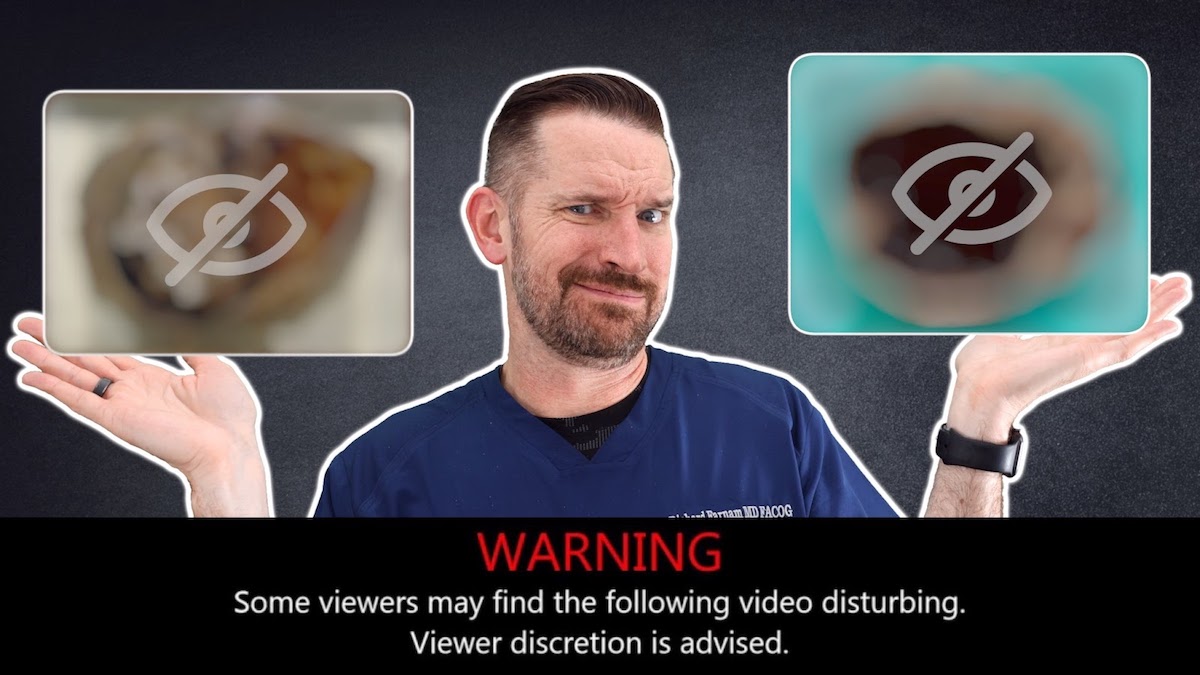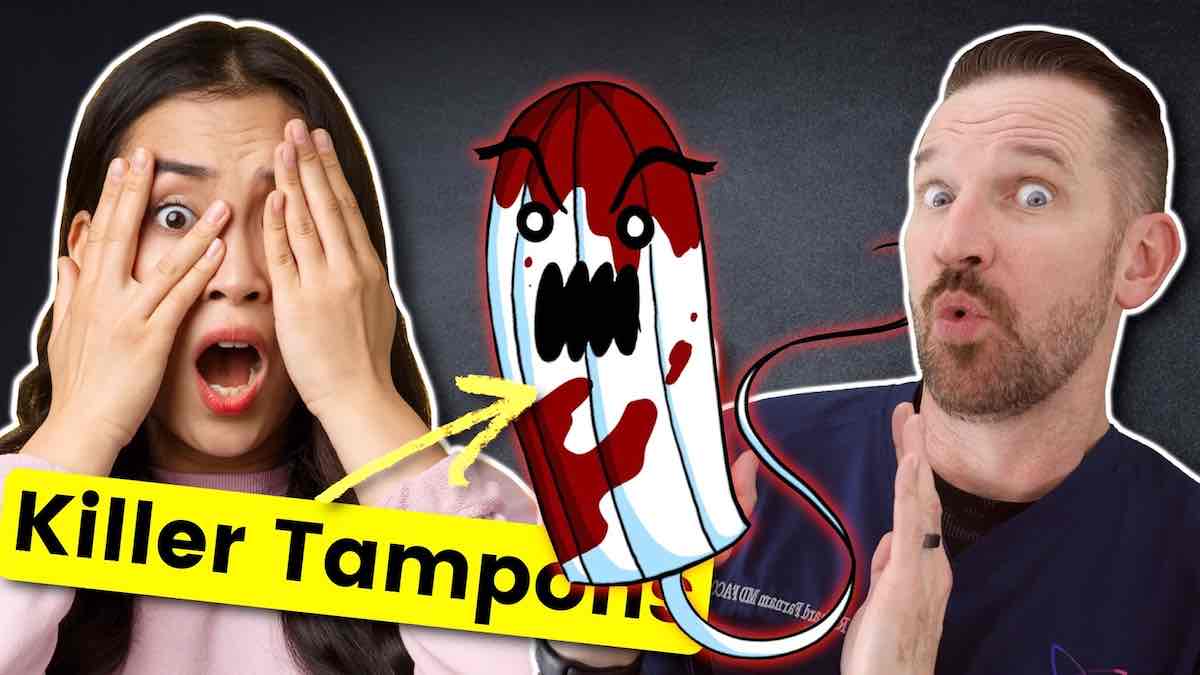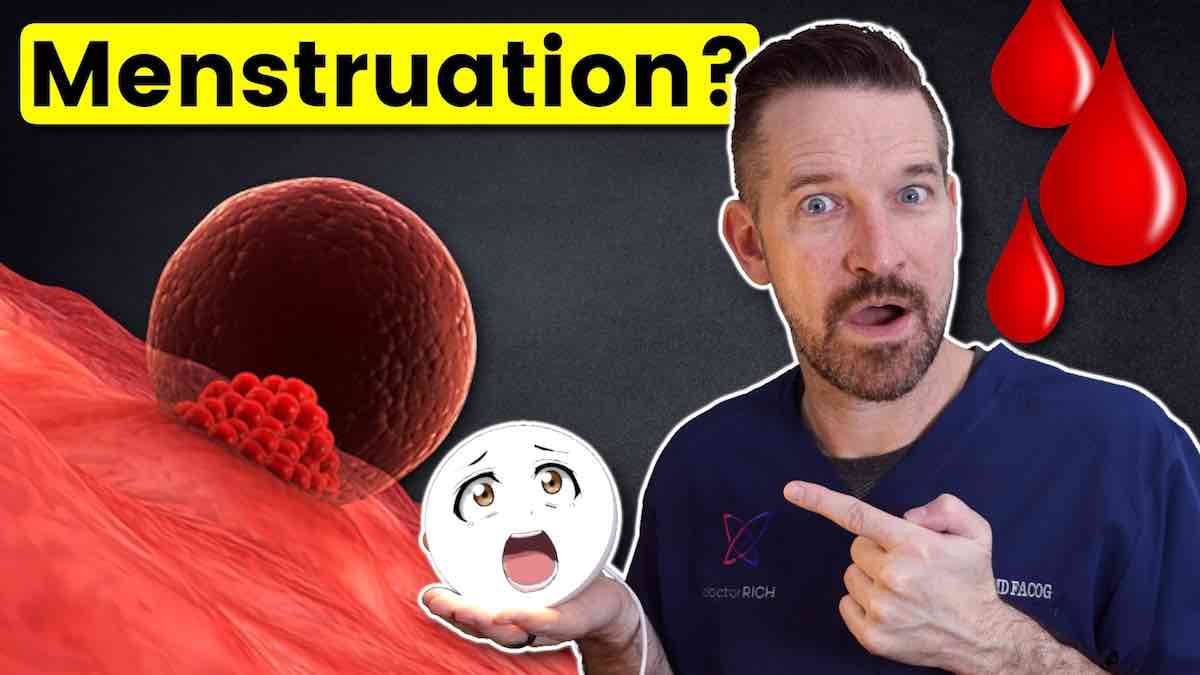Dr. Rich:
Are you worried about why your period cramps hurts so bad? Is it more than cramps? If you have severe pains and you’re concerned it might be endometriosis or some other condition, this video will help you tell the difference.
Don’t have time to read this blog post? Watch it here instead!
Hi, I’m Dr. Rich and my passion is to empower every woman with practical knowledge about the world of women’s health. Welcome back today. We have Darcy [Camacho 00:00:27] Who is a ER nurse, and also our research coordinator. Welcome back to the show.
Darcy Camacho:
Well, thank you for having me. So Dr. Rich, actually, speaking of period pain, is my period pain normal, or is it something more is a part of a disease process such as endometriosis?
Dr. Rich:
Great question as always, this is general health information and is not in any form, an individualized health consultant. If you do suffer from any of these symptoms, please consult your doctor. So that’s a great question. So period pains are very common up to 90% of women can complain of that. They’re basically caused by the production of an inflammatory mediator called prostaglandin. Okay. So this is produced during menstruation, which is the process by which a enriched uterine lining, which occurs in preparation for the implantation of a fertilized egg every month when fertilization doesn’t occur, the uterus contracts and all of the blood comes out okay. In doing this, that’s a muscle cramp, there’s the production of these inflammatory mediators. And it can cause a lot of pain.
Dr. Rich:
So how would we know if this is part of the normal process or if this is a disease process? So there are many disease processes that can cause pain for the purposes of this video we’re going to talk about one and that’s endometriosis.
Dr. Rich:
So is actually caused by that menstrual fluid, that lining that instead of all coming out during your period, it can back out through the tubes and then implant in places inside the pelvis, on the ovaries, the ligaments, the uterus itself, it can implant on other organs like bowel and bladder. So now when a woman’s menstruating, she’s not just having cramps from the uterine muscle, but the hormones are stimulating cramps to occur in all these other sites and that is why someone would have beyond the normal amount of pain and in some cases can be quite debilitating.
Dr. Rich:
In fact, when we’re trying to ascertain whether this disease process is something like endometriosis, we look at certain red flags, things like someone taking time off of school or work every month, someone who ends up with such significant pain that they go to the emergency room. One of the third signs is someone who would bring up their pain unsolicited. So if someone has an annual exam and they’re just there to say, by the way, I’ve got terrible pains, that’s someone that probably is not a simple case of period cramps, this is probably endometriosis.
Dr. Rich:
Now my practice, most people are coming in from other places as like a second, third, fourth, 10th opinion and most of the work that we do is surgical. So there are a lot of good information about medical treatment options, briefly that could include birth control pills or other hormonal methods of suppressing the endometriosis. NSAIDs which would be basically just your ibuprofen or your Motrin would be a good first line therapy for this. There can be more advanced treatments that are what’s called GNRH analogs that put your body into a temporary medical menopause. But by withdrawing the hormones from your body suppress the disease. There are many other good references that you can check out below. (See bookmark in this document for links)
Dr. Rich:
We’re going to talk mainly about the surgical treatment of the disease and what the options are for that.
Darcy Camacho:
So what you’re saying is I’ve tried birth control, I’ve tried NSAIDs, I’ve gone to the ER, I’m not working of course, for the pain and so what’s next?
Dr. Rich:
Yeah. So the diagnosis can be challenging. Actually, the only definitive diagnosis is a surgical diagnosis. We actually have to take the disease and look at it in the microscope and we have to find glands and stroma under the microscope, taken from tissue outside of the uterus. That’s the definitive diagnosis.
Dr. Rich:
Now we can have a high clinical suspicion. All right, actually, there are certain indicators that would make us statistically way more likely. So if you have a painful bowel movement during the period, that’s like a 90% chance that you have endometriosis.
Dr. Rich:
As a surgeon, our goal is to try to optimize the medical therapy primarily because we have to understand this is a chronic progressive condition. So through all of our therapies, we can make it better, but there’s no absolute cure on the table. So we talked about the medical treatment options. Now, if we’re ending up in the ER, now it’s time to kind of take this a little bit more seriously. The way that we will discuss the management will really be individualized according to what the patient’s needs are. So is the primary concern of fertility, because endometriosis can cause infertility. Or is the primary concern, just get this out of my life, I’ve had my kids I’m done, I just want to be better. Okay. So you would treat those two patients very differently.
Dr. Rich:
Now, unfortunately, the average patient sees 10 providers before they end up with an expert that can do a complete surgical excision.
Darcy Camacho:
So if the only diagnosis is surgery, why would someone delay surgery for treatment?
Dr. Rich:
So, I mean, there are risks with any type of surgery. Now, fortunately it’s a minor outpatient keyhole type surgery where there’s little tiny incisions, but there’s some recovery it’s five to seven days. People do have to take time off. There could be complications. So we always want to balance that. In a person’s lifetime, they may actually have to have more than one surgery. So it really is a combination of removing the disease with the surgery and then suppressing the disease from coming back. With the ultimate goal of either optimizing someone for fertility, to be able to get pregnant by removing the disease and then trying to get them pregnant and being pregnant by the way suppresses the disease by itself. So during that nine months, because of the highest estrogen levels, you’re suppressing the endometriosis. So typically people don’t have endometriosis pain during the period.
Dr. Rich:
But it can be difficult getting pregnant because the disease can implant on the tubes can actually block the tubes can cause adhesions that block, the tubes and the inflammation produced by all these little implants. So there’s not just, prostaglandins made in the uterus and all these other implants can negatively affect the egg and the sperm.
Dr. Rich:
So if we can go in there and remove all disease that will actually improve fertility, it will improve the pain and the time or the duration of effect, the latency until the next surgery is largely variable. That depends on the extent of disease the initial diagnosis, the extent of the resection and for some patients it’s just their pain tolerance. So someone may have mild amount of recurrence, but have a great amount of pain and conversely someone may have significant disease in the bowel, bladder, everywhere, and really only have minimal symptoms.
Darcy Camacho:
Okay. Dr. Rich who gets endometriosis and why?
Dr. Rich:
So people will get endometriosis there are several different theories. The most common theory is what’s called retrograde menstruation. Meaning instead of the blood coming out through the vagina, it will go back out through the tubes and implant inside the pelvis. That’s the most common.
Dr. Rich:
Now there can be some hereditary predisposition. So there’s not a gene per se yet that we’ve identified. But if your mother, your sister, your aunt, if somebody else had it, that does make you more likely to get it and more susceptible.
Darcy Camacho:
So besides those painful periods, what are other signs of endometriosis?
Dr. Rich:
Great question. So some people may think that that’s literally the only sign, but as we talked about, the disease can go to other pelvic organs. I think we mentioned that you’re very likely to have endometriosis if you have painful bowel movements during your period. So the term that we use is dyskinesia to describe painful bowel movements and the term that we describe something happening around the period is catamenial. So if you have catamenial painful bowel movements or urinating more often or painful urination during the period. These are all probably symptoms of endometriosis. So much so that a lot of patients are misdiagnosed. They’re diagnosed with interstitial cystitis or bladder inflammation. They’re diagnosed with bowel problems like irritable bowel syndrome. Now they may have those conditions, but there’s also equally likely chance that they don’t have that and it’s the endometriosis that’s causing the symptoms.
Dr. Rich:
We can also look at sexual discomfort. That would be something that a usual suspect would be endometriosis. Also just chronic pain. So there can be a disease lesions that build up enough space, five, six, seven, eight centimeter, sometimes particularly on the ovary that people just have chronic pain, pain every day. Now, typically it’ll still be worse during the period.
Dr. Rich:
So we talked about ways that we can look for symptoms that would suggest endometriosis there’s also symptoms that would suggest that it’s not endometriosis. So if there’s a chronic pain, but there is no correlation with your menses or with your period, that is not impossible, but it makes it less likely to be endometriosis. Or maybe there are overlapping conditions and that’s just the smaller one of the overall pain syndrome.
Dr. Rich:
So another example of where it may not be endometriosis is if it has no response whatsoever to hormonal modulation. So what I mean by that, a lot of people will take birth control and they’ll get a little bit of improvement, but it’s still pretty terrible. Then they come in, we’ll have to do some type of surgery, if it doesn’t influence in any way, or we talked about a medicine called Lupron or a GnRH analog, which takes away all hormones. If we do that and there’s no improvement in the pain, and this is a hormonal mediated disease, again probably makes it less likely to be endo or it could be endo, but a small part of a larger pain constellation. Other things that are going on, like the interstitial cystitis or the irritable bowel syndrome or the pelvic floor myalgia or other things that can happen.
Darcy Camacho:
So there’s meds, there’s surgery. I want surgery. What am I looking at?
Dr. Rich:
All right. So if we’re looking for not a cure, but as close to a cure, as we can get at least a cure now, okay. Then we’re really talking about surgical resection. So what this would involve in most cases is a laparoscopy or keyhole incision or robotic surgery. Where we can go in with tiny little incisions and we can remove the disease, whether it’s on the ovaries or ligaments or bowel, wherever it is, we will go in there and we’ll excise the entire disease burden.
Dr. Rich:
Okay. Now understand, we’ll take out everything that we can see with the eye but there could be microscopic disease, which is why it’s important after the surgery to continue suppression with the birth control or some other type of suppressive therapy.
Dr. Rich:
So be sure to come back for our next video, when we go into details about robotic surgical resection of endometriosis. Thank you for watching our video. This is a very important topic. There’s a lot of information out there. Unfortunately, there’s not a lot of great education. Even for providers. Patients may end up seeing a handful of doctors before they actually get a correct diagnosis. So if you thought that this was helpful and it personally helped you please hit like.
Darcy Camacho:
If you know someone who might have endometriosis share the video above.




